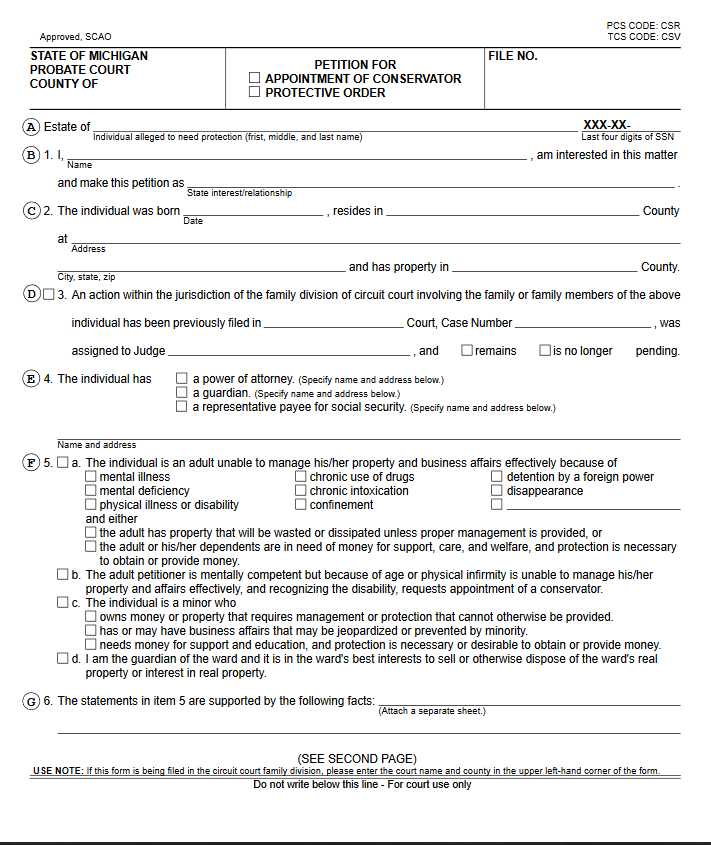Guardianship and Conservatorship in Michigan
Unfortunately there are times when an individual is unable to care for themselves or their affairs, and require assistance by an outside party. When this type of assistance is required, a guardian and/or conservator is appointed to handle the individual’s affairs. In Michigan, this is done through the probate court system, which strictly oversees the process to ensure an individual’s best interests are met. Because guardianships and conservatorships effectively take away an individual’s rights and freedoms, Michigan probate courts take this very seriously and require an annual review of guardians and conservators.
Individuals that typically require a guardianship or conservatorship are the elderly, minors, people with mental illness or mental disability, and those who have become incapacitated. While guardianships and conservatorships are similar to each other, they do differ in certain ways that will be explained shortly. It’s also worth noting that in certain situations both a guardianship and a conservatorship may be appointed for the same individual. Because these matters can be complicated, it’s wise to speak to an experienced attorney specializing in guardianships and conservatorships.
What is a Guardianship?
In Michigan, being appointed guardianship is when the legal decision making power of an individual has been granted to an outside party due to that individual’s inability to make those decisions for themselves. Guardianships are granted by a probate court and as mentioned previously they are evaluated annually to ensure that they are acting in the best interests of the individual they have legal guardianship status over.
Guardianships are common for elderly individuals, as well as minors who have lost their parents or previous guardians. It is also useful for individuals who are mentally handicapped or have a mental illness that prevents them from being able to make decisions on their own. Those who have been incapacitated often require guardianships – which can either have total control over decision making for that individual, or partial decision making in a limited guardianship – which allows the individual some control over decision making on their behalf. A person subject to a guardianship in Michigan is referred to as a “legally incapacitated person”.
What is a Conservatorship?
 A conservatorship in Michigan is very similar to a guardianship, except that it covers an individual’s property and financial matters. This is typically used in situations involving the elderly and incapacitated individuals who are no longer capable of fully handling their financial affairs.
A conservatorship in Michigan is very similar to a guardianship, except that it covers an individual’s property and financial matters. This is typically used in situations involving the elderly and incapacitated individuals who are no longer capable of fully handling their financial affairs.
In many instances a guardianship and a conservatorship are managed by the same person. However sometimes there are situations involving an individual that has large estate and/or a substantial amount of money. In those situations, it is common for an attorney to be given the role of conservatorship to ensure these matters are handled appropriately. A person subject to a conservatorship in Michigan is referred to as a “legally protected individual”.
Guardianships vs. Conservatorships
The fundamental difference between a guardianship and conservatorship is that a guardianship controls the decision making affecting the well-being and care of an individual, whereas the conservatorship focuses specifically on decision making surrounding the estate, property and assets of an individual.
As mentioned before, a single person can be both a guardian and conservator for an individual, or these duties can be split between two people. Also, there are instances where a guardianship is required, but a conservatorship is not – and vice versa. An experienced attorney can advise you as to what is appropriate for your situation.
Does Guardianship Override Parental Rights?
A common question for parents is whether or not a guardianship override parental rights over a minor. In Michigan, this is entirely dependent on how the guardianship is set up. Full or permanent guardianships do override parental rights, as one of the requirements to implement these in the first place is the forfeiture of parental rights.
In limited or temporary guardianship situations, the guardianship does not completely override parental rights – as long as the obligations of the parent laid out in the placement plan have been met. A gross failure to meet these obligations can result in the complete removal of parental rights. The obligations laid out in the placement plan are agreed upon by both the parent(s) and the court and vary on a case by case basis.
Attorney for Conservatorship and Guardianship
Guardianships and Conservatorships are often complicated and confusing matters that can be difficult for inexperienced persons to navigate. Therefore, it is strongly recommended to speak with an attorney specializing in guardianships and conservatorships in Michigan to make sure the individual concerned has the best possible outcome.
If you have further questions or legal issues involving these topics, talk to an estate planning lawyer at Sean J Nichols, PLLC.
